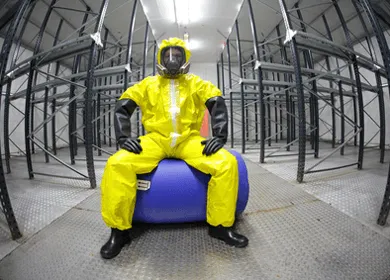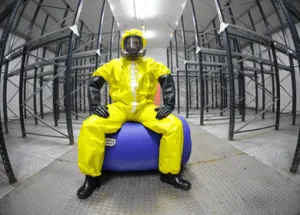
- Share on Facebook10
- Share on Pinterest
- Share on Twitter
Perhaps you do the best you can; eat a healthy diet, exercise and use only Certified Organic products in your home and on your body but………. you work each day, for 8-10 hours, in a place where toxic substances may be lurking. Millions of workers are put at risk daily because of an overload of toxicity in their workplace.
They are called occupational allergies, and they are becoming more and more common. Such things as “Sick Building Syndrome,” and “Occupational Asthma,” have gained increasing attention as workers report symptoms of headaches, runny noses, dizziness, and even tightening of the chest.
Poor Air Quality
Poor air quality is blamed for the majority of worker complaints. The thought that poor air quality is only found in old, run-down buildings is false. Even modern, well-built facilities can have poor ventilation that may cause allergens or irritants to become trapped inside the building. Malfunctioning heating and air systems can produce pollutants such as nitrogen dioxide, sulfur dioxide and carbon monoxide. Biological pollutants float freely through the air and include such things as mold, dander, exhaust form neighboring buildings and dust mites.
Volatile Organic Compounds
Volatile organic compounds (VOC) are dangerous gases that are responsible for a mounting list of worker health complaints. There are also many things that emit VOCs such as hairspray, construction products, cleaners, paints, finishes, vinyl carpets, photocopying, wood preservatives, fabrics, cooking, moth repellents, newspaper pressed wood furniture and sealing caulks. According to the Environmental Protection Agency, VOC concentrations are often up to 10 times higher indoors than outdoors and can cause a host of toxic reactions. Workers exposed to VOC’s may exhibit signs of toxicity such as headaches, dizziness, visual impairment, nose and throat irritation, vomiting and allergic skin reactions. Over time, exposure to VOCs can lead to serious health conditions like  loss of coordination, damage to the kidneys, liver and nervous system and even cancer.
loss of coordination, damage to the kidneys, liver and nervous system and even cancer.
What To Do?
If you suspect that the air quality in your office is making you ill, it is best to inform your supervisor immediately. Do a quick assessment to see how many other workers are being affected, there is strength in numbers. If the company you work for is sympathetic to your plea, it may consider testing the air quality and/or installing an air purification system. Duct work cleaning and servicing of the HVAC units is also recommended to improve air quality. If you suffer from upper respiratory problems such as asthma or have a compromised immune system, you will be more sensitive to the toxins. Try requesting a flexible work arrangement where some or all of your work can be done from home. If you have been exposed to toxic air, remember to detoxify your body. Eat a diet that is rich in whole foods, drink plenty of pure water and consider a cleanse to rid your body of the harmful buildup of toxins.
-The Alternative Daily
Sources:
http://www.epa.gov/iaq/voc.html
- Share on Facebook10
- Share on Pinterest
- Share on Twitter

